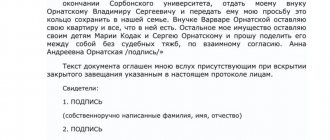After a person dies, a period begins when his successors have the right to enter into inheritance rights. These deadlines are prescribed in the legislation of the Russian Federation. But the heirs do not always have the opportunity to meet exactly this deadline. The question arises whether it is possible to enter into an inheritance after the death of the testator in a few years. Further, the article will discuss the procedure for declaring rights to property by late heirs, as well as the nuances of determining the possible period for this.
General deadlines for entering into inheritance rights
The inheritance procedure is the transfer of rights to the property of a deceased person to his successors. The circle of claimants to his property can be determined by law or indicated in the will. The basic principles of the inheritance procedure are prescribed in the Civil Code of the Russian Federation:
- according to Article 1114 of the Civil Code of the Russian Federation, it is necessary to apply for acceptance of the inheritance to the notary office at the place of last registration of the deceased or one of the largest objects of the inheritance mass;
- according to Article 1112 of the Civil Code of the Russian Federation, any property that legally belonged to the deceased (house, car, securities, etc.) can be inherited;
- According to Article 1116 of the Civil Code of the Russian Federation, persons specified in the will, applicants by law, as well as dependents can count on receiving inherited property.
The estate may also include obligations and some rights of the testator. The rights to alimony, use of real estate under a social tenancy agreement, receipt of benefits, etc. cannot be inherited.
According to Article 1175 of the Civil Code of the Russian Federation, if the heir accepts property, along with it he agrees to receive obligations to third parties that the testator acquired during his lifetime.
In order to accept an inheritance, there are two ways to enter into rights: actual and legal. Article 1154 of the Civil Code of the Russian Federation provides for a period for accepting an inheritance in both ways. It is six months from the date of death of the testator. Applicants who are not found within the established time limit lose their right to inheritance, and it is transferred to other successors in the next line. If there is a change in the order of successors, the acceptance period may be extended by 3 months.
If the applicant did not have time to enter into the inheritance after the death of the testator within 6 months, he has the right to restore the terms of entry or extend them. This condition is specified in Article 1155 of the Civil Code of the Russian Federation. The procedure for restoring the period of entry into inheritance rights is not simple and can create certain difficulties.
According to the law, the statute of limitations for restoring one's rights to inheritance is three years. But, this period begins to operate only from the moment when the reasons why the heir was unable to declare his rights to the property on time ceased to apply. It is from this moment that the countdown period of three years begins, during which you can restore your rights. In fact, the successor has 5, 10 and 20 years to apply to the court to restore the period of acceptance of the inheritance.
To do this, the late heir must go to court and provide papers that will prove his rights to receive the inheritance and restore the entry period. If he manages to do this within three years, which is a period of limitation, he will be able to receive his share of the inheritance even after 10 years.
What to do if the inheritance has not survived
If the return of the inheritance in kind is impossible, you have the right to receive monetary compensation.
If, when accepting the inheritance after the expiration of the established period for any reason (sale, exchange, gratuitous alienation), the return of the inherited property in kind is impossible, the heir who is late in accepting the inheritance has the right only to monetary compensation for your share of the inheritance.
Compensation is calculated based on the value of a specific item on the day the inheritance is opened - Art. 1105 Civil Code of the Russian Federation, art. 42 PP RF Armed Forces No. 9.
Is it possible to register an inheritance several years later?
The legislation of the Russian Federation specifies the period during which heirs can assume their rights. They were established in order to regulate the procedure for accepting an inheritance. If no successors appear within 6 months after the death of the testator, then the inheritance will pass to the next line of applicants. If none of the possible successors could be found, then the inheritance is considered escheat.
This condition is stated in Article 1151 of the Civil Code of the Russian Federation. In practice, very often there are situations in which the successors did not have the opportunity to accept the inheritance on time. In this case, they can go to court to restore their rights.
If the reason for missing the deadline for accepting the inheritance was significant, then it will definitely be taken into account in court. It is worth considering that according to the law, you can declare your rights to an inheritance within three years after the expiration of the legal period of acceptance. But, this period will begin at the moment when the reason for the omission has expired.
For example, the heir was undergoing treatment for 2 years and could not accept the inheritance in any way. The moment of completion of treatment will be considered the start of the 6-month countdown for entering into inheritance. After this period has passed, he will still have three years during which he can claim his rights to the property. The actual acceptance procedure also allows you to increase the possible time frame for claiming your rights to inheritance.
How to inherit legally?
The rule for accepting an inheritance according to the law is based on the principle of priority. The procedure is regulated by the Civil Code of the Russian Federation. According to the state act, inheritance is determined by degrees of relationship. The first category consists of immediate family members: parents, children, spouses. When cases arise of refusal of persons in the first line or the absence of such a group alive, the baton passes to the second stage of heirs. The total number of degrees of relationship is eight.
Actual inheritance
One of the possible ways to enter into an inheritance after the allotted period is actual acceptance. In this case, the heirs do not need to contact a notary office. This condition is stated in Article 1153 of the Civil Code of the Russian Federation. It is enough for the heirs to perform certain actions regarding the inheritance mass within the established time limits for the actual acceptance of the inheritance.
If the successor can prove this method of acceptance, then it will be possible for him to enter into inheritance rights after 15 years. But, at the same time, actions regarding the hereditary mass must be performed during the legal period of entry into rights.
In order for the court to recognize actual acceptance, the successor must take the following actions:
- use inherited property;
- maintain the property in good condition;
- ensure the safety of property;
- cover the costs of maintaining the property;
- carry out activities to improve the condition of the property.
To prove the actual acceptance of the inheritance, the successor must present documents to the court or notary office that confirm the use of the property. Such documents may include payment receipts, bank statements, utility bills, and more. It is important that such documents are issued within the six-month period for accepting the inheritance.
There are cases in which a late successor who applies several years after the death of the testator may be refused. Such situations include the following:
- the successor does not have evidence of actual acceptance or there is insufficient evidence;
- the heir accepted the property after the expiration of the six-month period for accepting the inheritance.
If the successor was able to present current, authentic documents that prove the actual acceptance of the property, even after five years, the right to inheritance will be established. Next, he will need to issue a certificate of acceptance and register the received inheritance in his name.
Restoration of rights to inheritance in court
Not only the notary’s office, but also the court takes part in resolving the issue of registering an inheritance. This body is contacted in cases where it is necessary to enter into an inheritance after the expiration of the legal period, cancel a will, or accept an inheritance. To restore the deadline for entering into inheritance rights, you must take the following actions:
- it is necessary to draw up a statement of claim;
- collect a package of documents that are submitted along with the application;
- submit applications and documents to the judicial authority located at the location of the inheritance.
The role of defendants can be either other successors or a notary who previously refused to recognize the acceptance of the inheritance. It is worth filing a claim in court to restore rights to an inheritance within six months from the moment it becomes possible to accept it.
In order for the court to make a positive decision on the claim for restoration of deadlines, the late successor must be presented with valid reasons why he was unable to accept the inheritance on time. Without compelling reasons for missing the deadline and their proof, a claim for reinstatement will not be considered.
Valid grounds include the following situations:
- incapacity or minority of the successor;
- illness of the heir;
- long business trip to another country or region;
- untimely awareness of the death of the testator and the opening of the inheritance.
In order to prove the grounds for missing the entry deadline, you can present a medical certificate, travel certificate, witness testimony and other documents. The court will consider those facts that are relevant to the relevant case. The applicant may receive a refusal from judicial officials in the following cases:
- the applicant incorrectly filed a claim to restore the terms of entry;
- the successor has no legal grounds to receive the inheritance;
- the reason for missing the period for accepting the inheritance is disrespectful or cannot be proven in any way.
It is worth considering that the heir who refused to accept the inheritance will not be able to restore his rights to the property after this decision. Also, persons who are recognized as unworthy of the inheritance mass will not be able to restore the time frame for accepting the property.
Existing features of inheritance by will
It is believed that a will is an indisputable document that gives the heir full right to receive property. Actually this is not true. Often, relatives who do not receive the share of the inheritance they claim are looking for reasons why the will may be declared invalid (see also: court decision to include property in the inheritance). Minor children or persons of retirement age, disabled people with benefits, are required to inherit half of the property.
Video: How to enter into an inheritance if many years have passed
Video: Entering into inheritance | Missed deadline | 100 The blonde has the right!
A separate category is inheritance with a condition. The testator expresses his will in a will with a condition, after which the inheritance is entered into. For example, a father bequeaths his apartment to his son, provided that he marries at 25 years old. It also happens that the document indicates a requirement for the birth of a child or a rather exotic desire, which may not seem entirely acceptable, but the heir is obliged to fulfill it. These conditions are usually announced at the time of opening of the inheritance. Cancellation of a condition is possible upon proof of its illegality or non-compliance with moral standards. A will is often drawn up without the knowledge of potential heirs, which leads to missed deadlines for entering into inheritance.
What to do when the entry deadlines have been reinstated?
Some successors are wondering how to enter into an inheritance after missing the period for its acceptance. To do this you need to go to court. If this body made a decision to restore the terms, the successor must obtain a certificate of accession to the rights to inheritance. To do this, do the following:
- contact a notary with the relevant documents;
- conduct an appraisal examination of inherited property;
- pay the state fee for issuing a certificate of inheritance.
The amount of the state duty is determined based on the results of the assessment examination. According to Article 333.24, heirs of the first and second priority are required to pay 0.3% of the value of the property, but not more than 100 thousand rubles, and other categories of successors - 0.6% of the value, but not more than 1 million rubles.
The assessment examination can only be carried out by an authorized person. Its results must be entered on a form that is certified by the seal of the head of the organization responsible for conducting the examination.
In order to issue a certificate of inheritance rights, you must prepare the following documents:
- court decision to restore the period of acceptance of inheritance;
- application for inheritance;
- death certificate of the testator, which can be obtained from the registry office;
- a will (if one has been drawn up);
- a certificate of the last place of registration of the testator with a note about his deregistration;
- documents that confirm that the testator has rights to his property.
After the successor receives a certificate of inheritance, he can contact the registration authorities in order to transfer the property to himself. In addition to the certificate, you must submit an application for registration and property documents to Rosreestr or the MFC.
Ways to restore deadlines
The applicant has the opportunity to enter into inheritance after 10 or more years in two ways:
- Mutual agreement of the parties.
- Trial.
The first option depends on the agreement of the remaining participants to share the formalized inheritance in equal shares with the new applicant. In this case, the co-heirs sign an agreement on the possibility of transferring the share to the new respondent. The notary cancels the validity of a previously issued certificate of title on the basis of drawing up a new document, the issuance of which entails changes in the certificate of registration of rights to real estate (if any) and re-registration.
In court proceedings, recognition of the right to inheritance is limited by the statute of limitations, which begins to be calculated from the moment the plaintiff declares a violation of his rights. After a positive decision in his favor, the applicant accepts the property, and the court determines new shares of the inheritance.
What is contractual inheritance?
Another opportunity to restore the right to accept an inheritance after a few years is through contractual entry. One option for a late heir is to turn to other heirs. If they agree to restore the period for accepting the inheritance and include the latecomer among the heirs, then he will be able to receive his share. This nuance is spelled out in Article 1155 of the Civil Code of the Russian Federation.
The late successor must draw up a paper with evidence of the existence of his rights to the inheritance, as well as a request to return him to the circle of applicants. Such a document must be sent to each of the heirs. If all successors agree, the notary will draw up an additional agreement to allocate a share of the inheritance to the late successor.
If all the successors are against restoring the deadlines for the late heir, then he needs to go to court with a corresponding claim.
If the successor manages to obtain a formal agreement from all successors to restore his rights to the inheritance, the notary will redistribute the property.
In practice, the late heir receives that part of the property that remains undivided. If there is no such part, then the late applicant will be allocated the inheritance by reducing the share of other successors. If the heirs managed to sell their received property, the court may establish compensation that they will have to pay to the new successor. Facebook
Court refusal
As already noted, the authority takes the plaintiff’s side only if he has justified his absence with good reasons. Otherwise, there will be a refusal to redistribute the property of the deceased. Unexcusable circumstances include:
- minor health problems. So, a person could have been operated on and the recovery period took several months, after which the patient returned to work;
- ignorance of current legislation. The man had the opportunity to purchase things, but missed the opportunity to submit papers due to his imprudence;
- lack of information about specific items.
Question:
Does a person have the right to settle the issue of values if he previously knew nothing about the distributed benefits?
Answer:
Sometimes citizens deliberately refuse to inherit due to the fact that they had no idea about the presence of any valuables in the mass. After receiving information about the division of real estate, which is not encumbered with debts and represents an expensive asset, the desire to challenge the decision appears instantly. However, the heir who has formalized his right is unlikely to follow the applicant’s lead. If you go to court, the authority will also refuse to reopen the case, since the reason is not valid.







